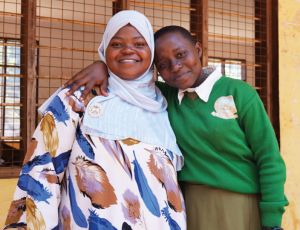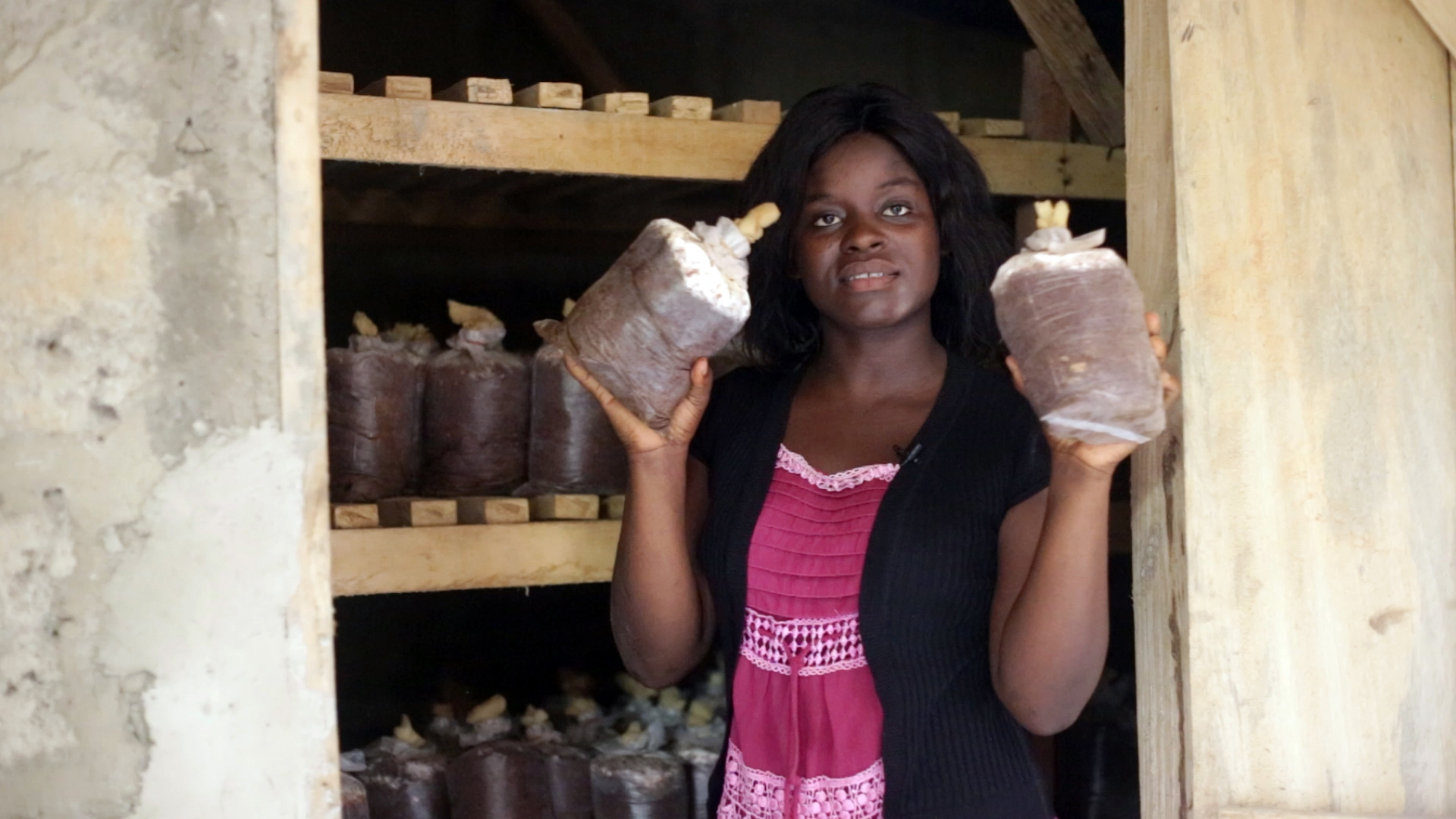Martha Fanny Gaisie, a 28-year-old old woman who lives in Ghana, grew up in hardship with her mother having to support 10 children. Martha, her mother, and her community are experiencing the increasing effects of climate change first-hand: “I have seen the growing impact of climate change in my community. We rely on the rains for agriculture. Most people can’t afford irrigation. Over recent years the weather has become more unpredictable. My mother is a smallholder farmer and the changes in rainfall patterns have really affected her. The wells dry up after extended drought. We also have bush fires during the extended dry season – they can burn someone’s whole farm. Famers in my village rely solely on the two rainy seasons for their major farming activities. Unfortunately, in the past few years, whenever they planted, the rains did not come at all or came sparingly. Already germinated crops died due to insufficient rains or excessive heat and sunshine. Many cash crops died, and those that survived yielded little. That meant that parents were unable to provide for items for their children that they needed for their schools, as farming is their sole source of income and livelihood.”
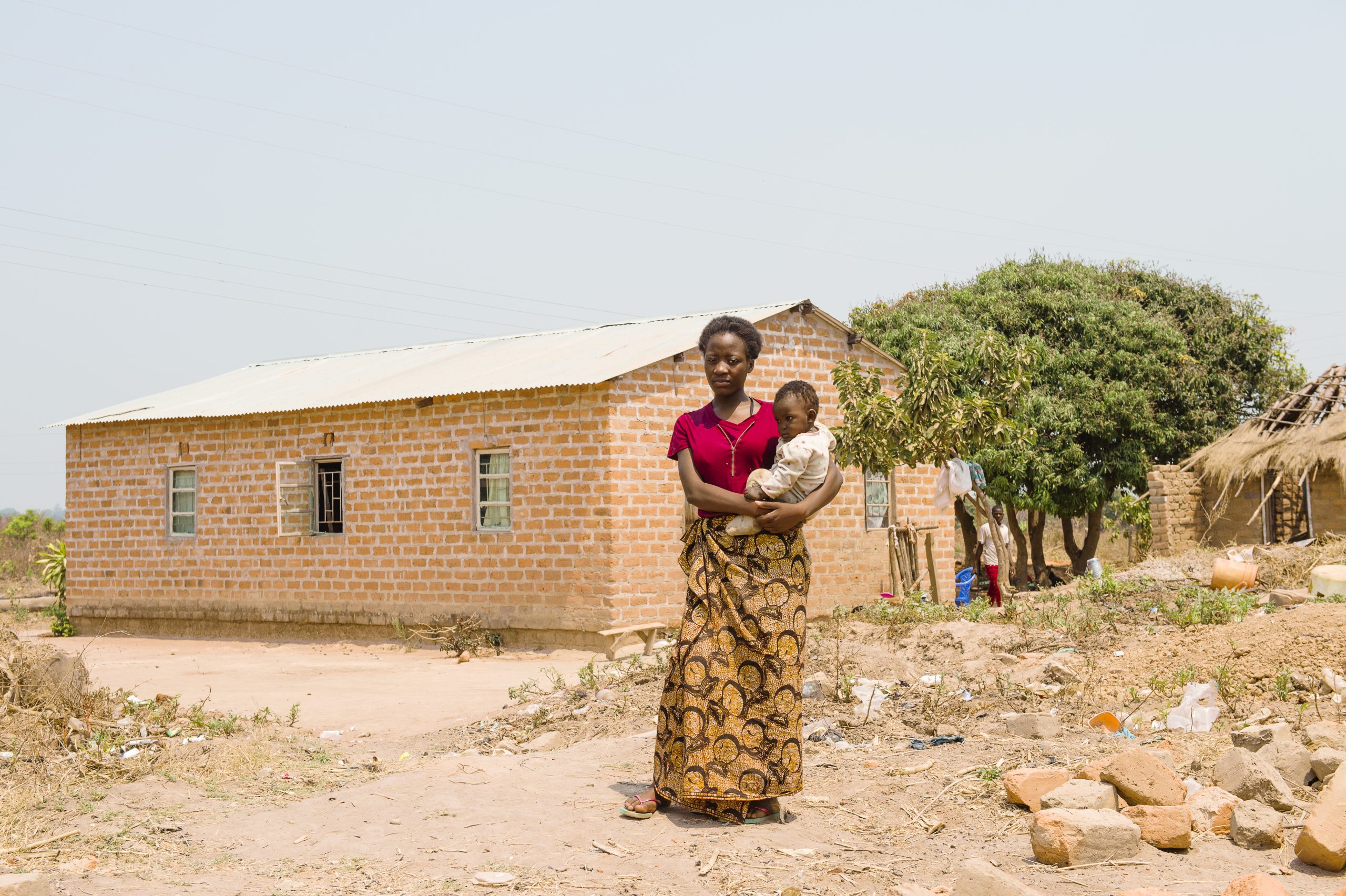
For girls like Faith*, climate change is increasing the risk of exclusion from education and poverty. CAMFED is working in communities across Ghana, Malawi, Tanzania, Zambia and Zimbabwe to mitigate the impact of climate change and keep girls like Faith in school. Location: Samfya, Zambia. (Credit: CAMFED/Eliza Powell) *Not her real name
Women at greatest risk from climate change
Four out of five people displaced as a result of climate change are women. [1] Seventy percent of African people rely on agriculture, which is especially vulnerable to the effects of climate change, [2] for their livelihood — and more than 40 percent of those who are dependent on agriculture are women. [3] Young people already face a precarious future, with few employment opportunities. Climate change, by affecting the jobs available locally, and making it harder to live off the land, exacerbates their vulnerabilities. Young women’s futures, their health and their wellbeing are being impacted by climate change, whose effects plunge families into poverty. In times of drought, girls can be removed from schools and married for a bride price as a coping mechanism when families have insufficient resources. [4] The lack of education impedes their ability to secure a livelihood. At least “200 million adolescent girls from the poorest communities” are more vulnerable to the effects of climate change. [5]
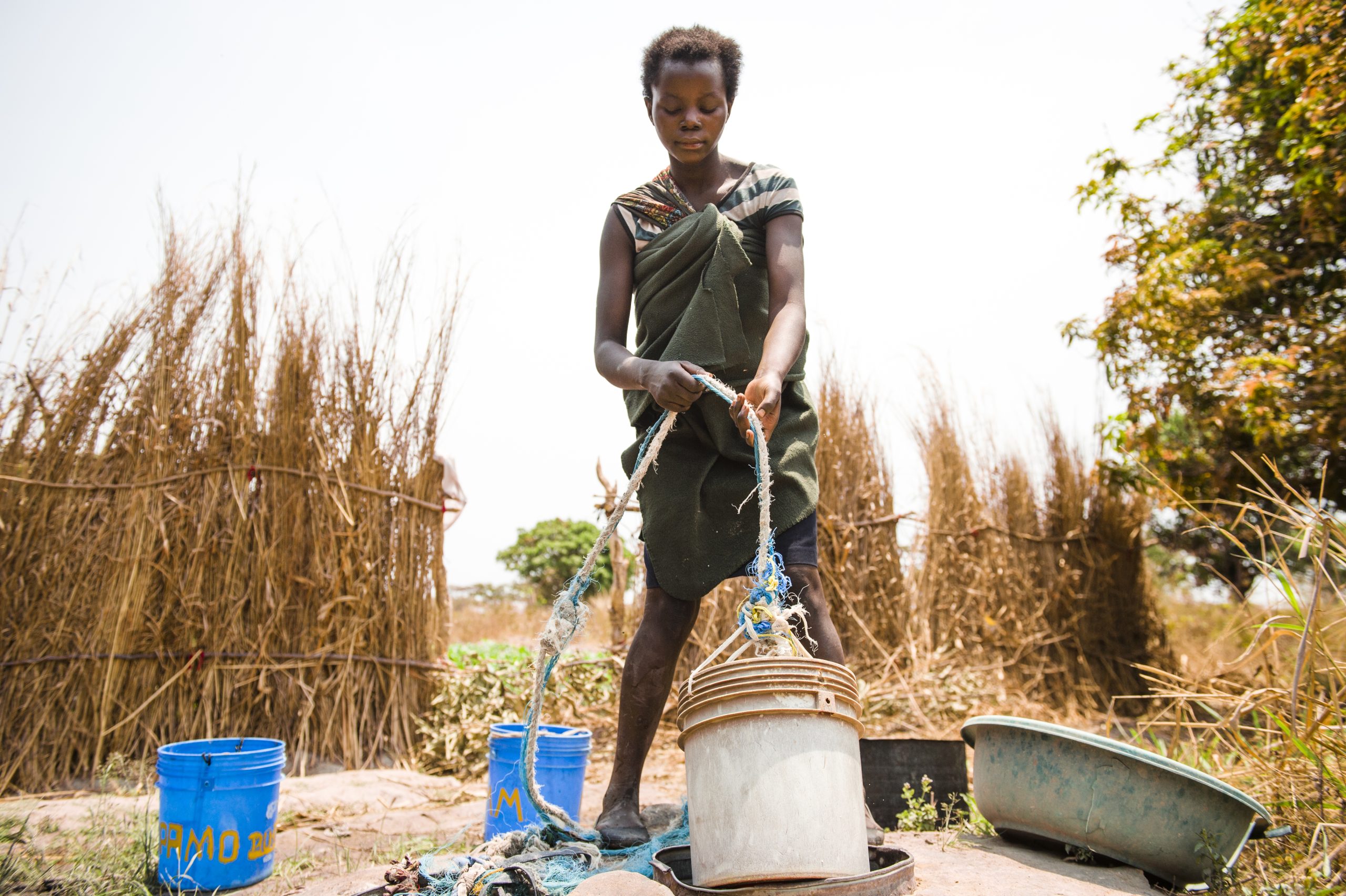
Girls and women are disproportionately affected by climactic events such as droughts and floods. Location: Samfya, Zambia. (Credit: CAMFED/Eliza Powell)
Creating women-led sustainable businesses: low costs, significant impacts
In a context of unemployment and changing weather patterns, young women are looking for safe and sustainable forms of entrepreneurship to create a climate-resilient livelihood for themselves and others. Martha explains, “I felt great when I completed my tertiary education with a degree in Education Science. But even with a degree it can be difficult to get a job – you can wait a long time and still not get it. The unemployment rate is very high in my country, and it’s especially challenging for fresh tertiary graduates, who lack the work experience that is often required. Women without financial resources can become especially vulnerable to sexual exploitation, entering relationships in return for financial support. So I decided instead to set up a sustainable business and to help others through my business and my work with CAMFED.”
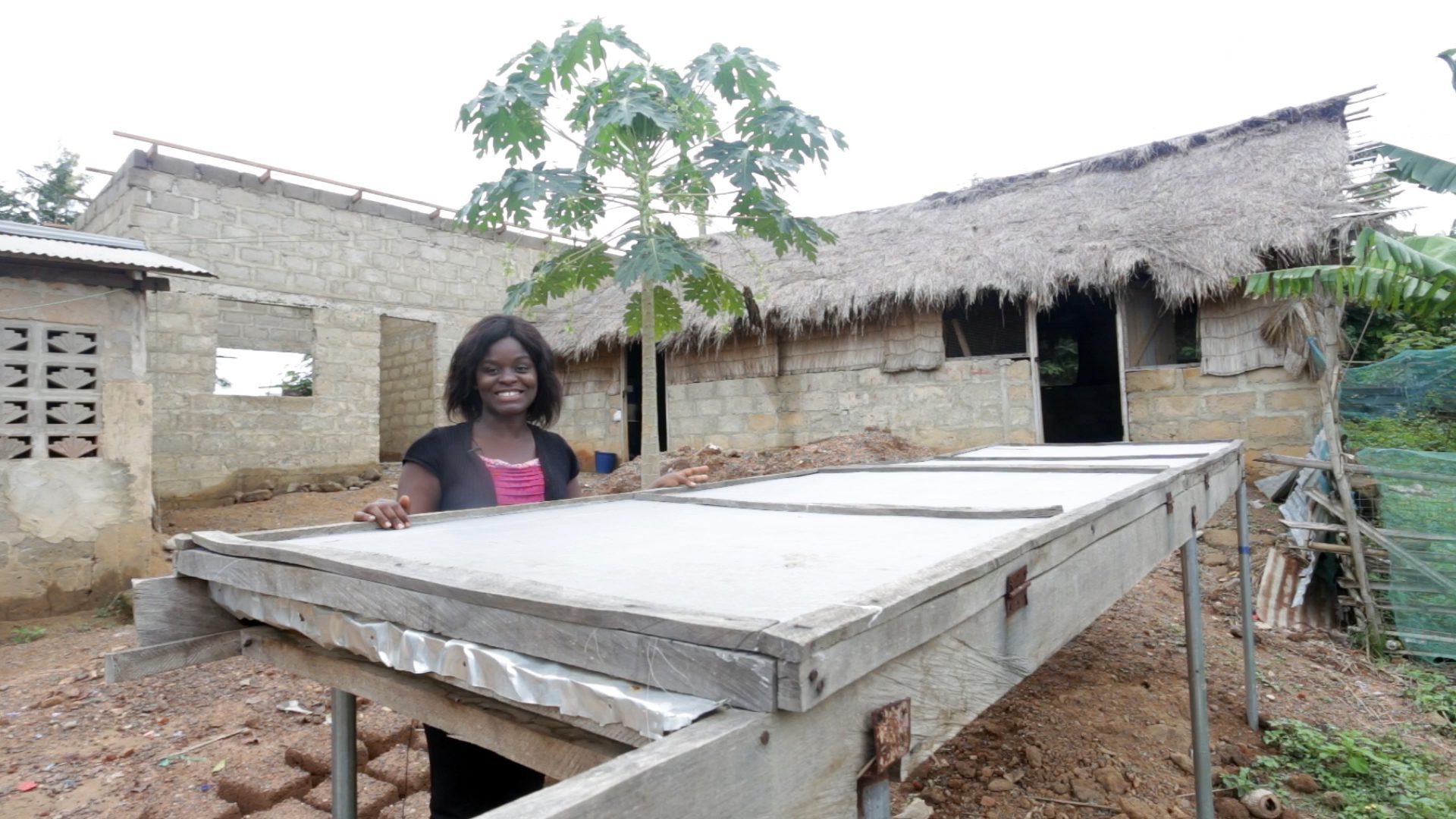
Martha Fanny Gaisie at her mushroom farm in Cape Coast, Ghana. (Credit: CAMFED/ Joseph Assah Mills)
With CAMFED’s support, Martha has built a climate-smart agriculture enterprise. “My business is called Healthy Choice Agro-Consult. We produce oyster mushrooms. Mushrooms are a climate-smart crop. There is no need to cut down trees or burn crops. They grow in an enclosed area not vulnerable to climate vagaries. We use waste sawdust from nearby wood mills as compost, and after we have harvested the mushrooms the saturate becomes an organic fertiliser which I sell to farms in the community.” Green innovation can be achieved without expensive equipment. Martha’s climate-smart mushroom business minimises waste, avoids reliance on rain-fed agriculture, and contributes to good nutrition.
Supporting women-led businesses has a significant impact not only on the business owner’s life, but also on the wider community, helping to tackle the youth job crisis that is unfolding in Africa: “My business has enabled me to meet my own needs, and to support my child and two of my younger siblings to go to school. I also have four paid employees; two of whom are women. In order to give back, I also set up the Empowered Youth Foundation, which has provided mentoring and support to 240 girls. I personally support another three girls to go to school and have provided four women with start-up capital, enabling them to launch their own businesses. Through my Foundation I also train climate ambassadors and set up Climate Action Clubs with young people to educate the community on tree planting and protecting the environment.”
Throughout this process, CAMFED has supported Martha. “I have had help to launch and grow my business, including through support from CAMFED and the Mastercard Foundation in the form of entrepreneurship training and business investment. I was connected to the Ghana Enterprises Agency and the training they provided was critical to shape my business idea and equipped me with the entrepreneurial skills and attitudes I needed to excel as a start up. The continuous support of the enterprise team at CAMFED has been so vital – helping me to persist when I faced challenges. And I secured funding to invest in my business. Training, funding, guidance, coaching and mentorship – together they helped me to persist. The CAMFED Association (which is a network of women leaders educated with CAMFED support) has provided me with positive peer support. My older sisters in the network made me want to give back more to other women as I derived inspiration from what they were doing in their communities.”
The road to resilient and sustainable livelihoods in Africa
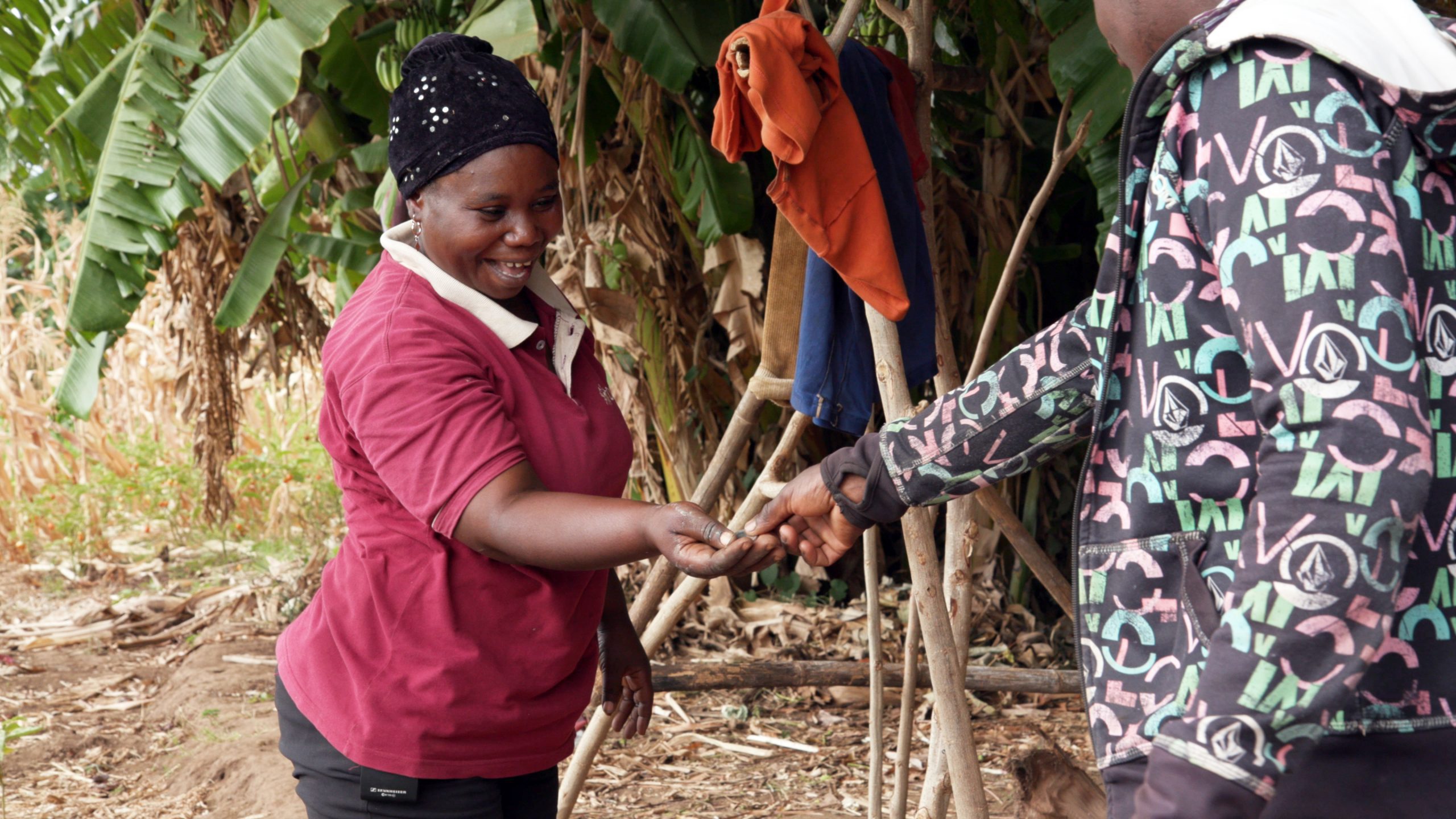
Mwanaisha, a CAMFED Association member and entrepreneur, trading her farm produce. Location: Morogoro, Tanzania. (Credit: CAMFED/Eliza Powell)
CAMFED’s programme and Martha’s own experience help us identify what enables young women entrepreneurs from marginalised backgrounds to succeed – and particularly to push beyond “necessity” enterprise (farming to survive and feed the family) into “opportunity” enterprise (adding value to products and seizing market opportunities).
First, support education and skills: Young women need to be supported to complete secondary school and gain foundational literacy and numeracy skills, but also life and self-development skills. These skills, such as critical thinking, creativity, problem-solving, and team work are critical to build a successful livelihood. Business skills – including business planning, identifying a competitive niche, calculating profitability and market research – are all important technical skills for entrepreneurs wishing to grow their businesses.
Second, create peer support amongst women and link to female role models: This helps young women believe in themselves, persist in the face of challenges, learn from each other, and problem-solve together. For Martha, the support of other young women – members of the CAMFED Association (a network of 208,000 young women across Africa, committed to supporting each other, and more girls in school) was critical in her success.
Third, ease access to affordable business finance: This is critical, particularly given the financing gap for women, estimated to be as large as USD 42 billion in Africa. [6]
Fourth, provide market knowledge and access, and technical assistance: Young, rural women are some of the least connected in the world, so linking them to information about growth sectors and market access supplemented with technical assistance is vital.
Finally, focus on ethical leadership: A social enterprise that helps others, a commitment to “pay it forward”, will create quality jobs and support strong and resilient communities.
In a world that feels especially uncertain for young people post-COVID-19, with young women in work hit the hardest, Martha is nevertheless hopeful for the future: “I am very confident of my future. This is because I feel I can sustain and grow my business without having to necessarily rely on employment by the government or private sector. I can provide for my needs, create jobs for others and impact others’ lives. I also have a wide network of friends, and the CAMFED Association sisterhood – they are my support system when I am in need. In this situation of climatic insecurity, I can sometimes lose hope but I strongly believe that the hope of tomorrow is in our hands today, and I can take decisions and actions that can go a long way to write that future.”
According to the United Nations Environment Program, “No continent will be struck as severely by the impacts of climate change as Africa”. [7] Climate-smart agricultural enterprises can be one important way to build livelihoods resilient to climate change, and CAMFED is supporting just that. The University of Cambridge and CAMFED are collaborating to develop a Commission on Young People and Work in Sub-Saharan Africa and South Asia. A core focus of the Commission’s work will be to support youth employment, especially for young women, and CAMFED’s experience will be integral to that.
About the Authors:
Dr. Garima Sahai is a post-doctoral research associate, Commission on Young People and Work, Department of Geography, University of Cambridge, and bye-fellow, Murray Edwards College, University of Cambridge.
Martha Fanny Gaisie is a member of the CAMFED Association of women leaders educated with CAMFED support, as well as an entrepreneur and philanthropist. Since 2020, she has lent her expertise to CAMFED’s work as a Programmes Coordinator for CAMFED Ghana.
Catherine Boyce is Executive Director for Enterprise and Climate at CAMFED. She works collaboratively with colleagues across Africa to support young women to achieve fulfilling livelihoods, to embed climate resilience across CAMFED’s work and to share learning.
Footnotes
[1] UNDP and Global Gender Climate Change Alliance (2016), “Overview of linkages between gender and climate change”, Gender and Climate Change Policy Brief. (https://www.undp.org/sites/g/files/zskgke326/files/publications/UNDP%20Linkages%20Gender%20and%20CC%20Policy%20Brief%201-WEB.pdf). (Accessed Aug 03, 2022)
[2] Biteye, M., (2016), “70% of Africans make a living through agriculture, and technology could transform their world”, World Economic Forum, 6 May 2016.(https://www.weforum.org/agenda/2016/05/70-of-africans-make-a-living-through-agriculture-and-technology-could-transform-their-world/). (Accessed May 30, 2022)
[3] Luc, C., and Demery, L., (2018), Agriculture in Africa : Telling Myths from Facts, Directions in Development, Agriculture and Rural Development, Washington, DC: World Bank. (https://openknowledge.worldbank.org/handle/10986/28543). (Accessed May 30, 2022)
[4] Chigwanda, E., (2016), “Is climate change the weakest link in girls’ education programming?”, 20 September 2016, Education Plus Development. Brookings(https://www.brookings.edu/blog/education-plus-development/2016/09/20/is-climate-change-the-weakest-link-in-girls-education-programming/). (Accessed May 30, 2022)
[5] Sims, K. (2021). Education, Girls’ Education and Climate Change. K4D Emerging Issues Report 29. Institute of Development Studies. DOI: 10.19088/K4D.2021.044.
[6] African Development Bank Group, (n.d.) “Why AFAWA?”, AFAWA – Affirmative Finance Action for Women in Africa, n.d. (https://www.afdb.org/en/topics-and-sectors/initiatives-partnerships/afawa-affirmative-finance-action-for-women-in-africa/why-afawa). (Accessed May 30, 2022)
[7] UN Environment Program (UNEP) quoted in Khadka, N., S., (2019), “Madrid COP25: What does Africa want from the UN climate summit?”, 9 December 2019, BBC News (https://www.bbc.co.uk/news/world-africa-50712486). (Accessed May 30, 2022)
